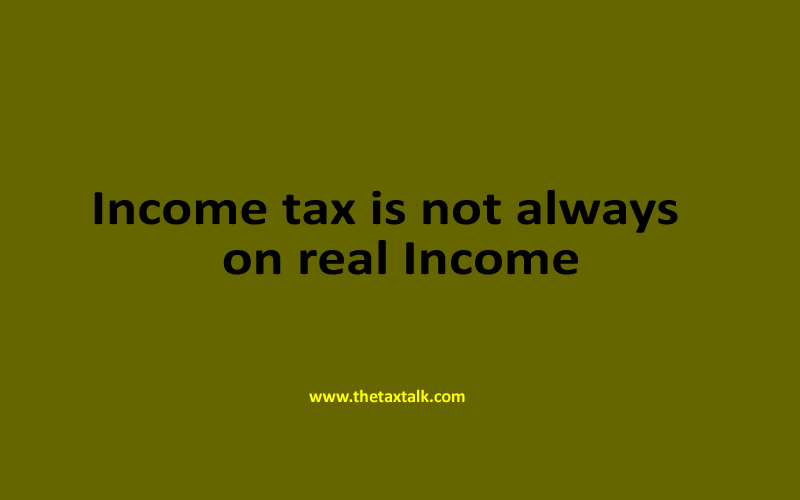![]()
Query 1]
My nephew is working as a LIC agent for the last ten years In 2011 he has purchased a piece of land for Rs. 4,00,000/ and the Govt. guideline price for the same as claimed by the registry dept was Rs. 8,00,000/ -. Accordingly, he was asked to pay registry fees on Rs. 8,00,000/ and he paid it and the registration was accepted by the registry office. My query is, what way IT dept will treat it or interpret it and what will be tax implication? [Narayan Chawda- nchawda66@gmail.com]
Opinion:
- It’s a misconception that income-tax is payable on actual & real income only. There are provisions in income tax Act whereby taxpayers are required to pay tax without actual income also. One such instance is purchasing the property below stamp duty valuation which is taxable u/s 56(2)(vii).
- Section 56(2)(vii): If any individual/HUF purchases any immoveable property for an inadequate consideration (i.e., if the stamp duty valuation of the property is more than the actual purchase price) and the difference between stamp duty valuation and actual purchase price is more than 50,000/-, then such difference shall be taxable in the hands of the individual or HUF as “Income from Other Source”. For this purpose, stamp duty valuation as on the date of agreement to sale could be considered if any part of the consideration is paid by the purchaser otherwise than in cash. Amount would be taxable irrespective of the fact that the transaction is genuine, or the purchase was due to few defects in the property or it was a distress sale on the part of the seller etc.
- Above taxing provision has been brought in the statue book by the Finance Act-2013 and is made applicable from the FY 2013-14. Your nephew has purchased the property in the FY 2010-11 (or 2011-12) when the relevant taxing provision was not there in the Income Tax Act-1961. As a result, no tax implication was attracted at the time of purchase or in any subsequent year. Whenever your nephew sale the property, he would be required to pay capital gain tax by considering cost of acquisition at Rs. 4 Lakh only ( & not Rs. 8 Lakh).
- So far, the provision is applicable only to Individual & HUF. However, firm, Companies etc are also proposed to be covered by the recent Union Budget-2017.
Query 2]
The amount of long term capital gain invested in Rural electrification bonds is being received shortly after 3 years completion period. It is just about Rs. 20 Lakh. Please let me know where that amount could be invested other than bank fixed deposit? Can this be invested in senior citizens saving scheme (but the maximum limit is 15 lakhs)? [n_premkumar@hotmail.com]
Opinion:
Principal amount received from REC/ NHAI after completion of lock-in period of investment of 3 years would be totally tax free. You are free to invest the amount anywhere without any tax implications.
Query 3]
My grandfather has attained the age of 80 years on 1/11/2016 (Date of birth is 01/11/1936). Kindly clarify:
- Whether the slab of very senior citizen (rupees 5 lakhs) of income tax will be applicable to him during the current financial year?
- Whether he is exempted to file I.T return if his income is less than 5 Lakhs and whether this practice of non- filing the I.T return will continue till his income crosses the exemption limit of very senior citizen in future? [khan@gmail.com]
Opinion:
- Any individual who has attained the age of 80 years at any time during the financial year is considered as very senior citizens and would be entitled for the higher basic exemption limit of Rs. 5 Lakh. Your grandfather has attained the age of 80 years on 01/11/2016 & so he would be eligible for higher basic exemption limit of Rs. 5 Lakh.
- If income of any individual is below the basic exemption limit then normally income tax return is not required to be filed. In your specific case, filing of the return would not be mandatory so long as it is within the applicable basic exemption limit.
Query 4]
I am having a RD account with SBI since April’2014 and the same will mature in March’2017. Kindly advice on the tax treatment of the interest component to be received on the RD Account. The expected interest amount will be around Rs. 9,000/-. [Dr. Rabinarayan Patnaik- rnpatn@gmail.com]
Opinion:
Interest on RD A/c:
Interest received out of investment in RD with bank is taxable. It appears that you have not offered any income on RD A/c on accrual basis in between 2014 to 2017. You can offer entire amount of interest income (Rs. 9,000/-) for taxation in FY 2016-17 i.e., at the time of maturity.
Query 5]
We want to purchase flat in Mumbai, one third amount will be contributed by me & my wife and two third by my son, but he desire registration of flat in my name. Can this be done? Kindly advice. [Ghanshyam Agrawal-dragrawal.gp@gmail.com]
Opinion:
Yes, it can be done without any tax liability / implications.
[button color=”” size=”” type=”round” target=”” link=”https://thetaxtalk.com/”]home[/button] [button color=”” size=”” type=”round” target=”” link=”https://thetaxtalk.com/submit-article-publish-your-articles-here/”]Submit Article [/button] [button color=”” size=”” type=”round” target=”” link=”https://thetaxtalk.com/discussion-on-tax-problem/”]Ask Question [/button]

